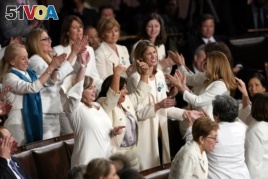06 February, 2019
Facing a divided Congress for the first time in his presidency, U.S. President Donald Trump called for the nation to "govern not as two parties but as one nation."
The call for unity came as the president delivered his yearly State of the Union Tuesday night in front of a joint session of Congress. The nationally televised speech was delayed for one week, after House Speaker Nancy Pelosi withdrew her invitation during the 35-day government shutdown.
The president opened his speech Tuesday by describing what he called "an economic miracle," with rising wages, more jobs and tax cuts for working families.
Trump also said that "foolish wars, politics, or ridiculous partisan investigations" are the only things that can hold the country back.
"If there is going to be peace and legislation, there cannot be war and investigation," he declared. He was talking about the numerous investigations into his administration and his own finances.
The partial government shutdown began on December 21 because of disagreements over money to build a U.S.-Mexico border wall. On January 25, Trump and Congressional leaders agreed to temporarily fund the government for three weeks.
Trump and Congressional leaders now have until February 15 to pass long-term bills to fund the government. With that deadline 10 days away, Trump called on lawmakers "to defend our very dangerous southern border" from gangs and drugs.
Trump said in his speech that his proposed border wall is now "a smart, strategic, see-through steel barrier – not just a simple concrete wall."
Pelosi has repeatedly said the House will not provide money to build a wall.

Members of Congress cheer after President Donald Trump acknowledges more women in Congress during his State of the Union address to a joint session of Congress on Capitol Hill in Washington, Tuesday, Feb. 5, 2019. (AP Photo/Carolyn Kaster)
In a rare sign of unity, female Democratic lawmakers stood up to cheer the president after he made comments about women in the workplace. The female lawmakers wore white in honor of the suffrage movement that gave women the right to vote.
The president on Tuesday recognized that "more women (are) serving in the Congress than ever before."
On foreign policy, Trump announced that he will meet with North Korean leader Kim Jong Un later this month in Vietnam to, in his words, "continue our historic push for peace on the Korean Peninsula." Trump said his administration also "has acted decisively to confront the world's leading state sponsor of terror: the radical regime in Iran."
The president repeated his claim that the Islamic State has been destroyed. He again called for bringing American troops home from Syria and Afghanistan. Trump said, "Great nations do not fight endless wars."
Some of the president's foreign policy comments are not in agreement with experts. In a recent appearance before Congress, the nation's intelligence chiefs said that North Korea is unlikely to give up all of its nuclear weapons and that ISIS is still "dangerous."
Stacey Abrams of Georgia was chosen to give the Democratic Party's response to Trump. She said in her televised speech, "Let's be clear: Voter suppression is real."
Abrams narrowly lost a close election in November. Had she won, she would have become America's first black female governor.
On Tuesday night, Abrams asked Americans to "hold everyone, from the very highest offices to our own families, accountable for racist words and deeds and call racism what it is — wrong."
I'm George Grow.
Hai Do wrote this story for Learning English. Ashley Thompson was the editor.
________________________________________________________________
Words in This Story
ridiculous - adj. unreasonable
partisan - n. a person who strongly supports a particular leader, group or cause
suffrage - n. the right to vote
regime - n. a particular government
response - n. something that is said as a reply